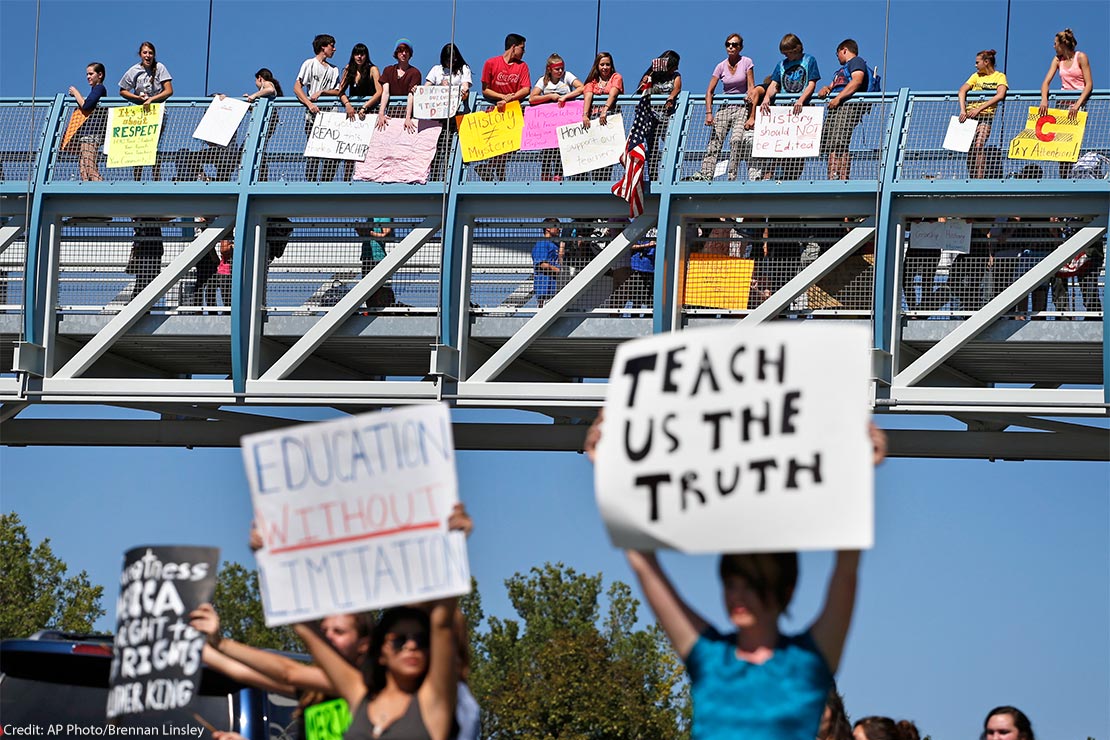
Earlier this month, a federal judge blocked Florida from enforcing the Stop Wrongs Against Our Kids Act (Stop W.O.K.E. Act) in the state’s colleges and universities. Florida is just one of over a dozen states across the country that have passed laws censoring discussions around race and gender in the classroom, and this is the first time a court has ruled that this type of classroom censorship law is unconstitutional. This preliminary victory could present an opportunity to bolster similar challenges to classroom censorship efforts nationwide.
The order came in a lawsuit we filed on behalf of seven instructors and one student in colleges and universities across Florida to challenge the Stop W.O.K.E. Act, which limits the ways concepts related to systemic racism and sex discrimination can be discussed in teaching or conducting training in workplaces or schools. The concepts were parroted from Executive Order 13950, issued by then President Trump and rescinded by President Biden, and have been incorporated in similar classroom censorship laws introduced and passed in other states.
We argued the law violated the First and Fourteenth Amendments because it restricts instructors from teaching and students from learning certain viewpoints, the law is unconstitutionally vague, and it intentionally discriminates against Black instructors and students. The order describes the law as “positively dystopian,” and makes the following key findings that could be leveraged to challenge similar classroom censorship legislation in other states:
1) Instruction in higher education is protected by the First Amendment and academic freedom.
In response to our lawsuit, Florida terrifyingly asserted that it had the absolute right to control what educators can teach because it is government speech, noting that university professors are public employees. This claim contradicts the longstanding recognition that academic freedom is a “special concern” of the First Amendment. In the university setting, this means the First Amendment protects universities’ and professors’ right to make teaching choices without government censorship targeting disfavored viewpoints. The state’s position that university instructors are “simply the state’s mouthpieces” could have dangerous consequences, including allowing the state to literally dictate lessons and have educators simply read from a script. The order held that educators’ First Amendment right to teach concepts prohibited by the Stop W.O.K.E. Act far outweighed the state’s interest in indoctrinating students to its preferred viewpoint.
2) University students have their own First Amendment right to receive information — including concepts related to racism and sexism prohibited by the Stop W.O.K.E. Act.
The order recognized that the First Amendment protects not only the right to speak, but also the right to receive information. In the higher education context, the court held that the scope of a student’s First Amendment right to receive information corresponds to the instructors’ First Amendment right to share.
3) Like the Stop W.O.K.E. Act, other classroom censorship laws are vulnerable to challenge as unconstitutional, viewpoint-based restrictions.
The Stop W.O.K.E. Act limited instruction to viewpoints that the legislature agreed with, even when those viewpoints contradict research, academic scholarship, and foundational understandings of academic disciplines. Based on their academic training and research, our professor plaintiffs teach that some people are disadvantaged in America, and particularly in the criminal legal system, due to their race; describe the existence of “white privilege” and its impact in society; and advocate for affirmative action to ensure campus diversity. The Stop W.O.K.E. Act forced our professor plaintiffs to choose between teaching these evidence-supported concepts, which are foundational in their field, or censoring their viewpoints to comply with the law. As Judge Mark Walker noted, “[t]he law officially bans professors from expressing disfavored viewpoints in university classrooms while permitting unfettered expression of the opposite viewpoints,” in contravention of the First Amendment.
4) The Stop W.O.K.E. Act was unconstitutionally vague on various grounds.
First, the eight concepts prohibited by the law are vague. The order found that some of the prohibited concepts were impossible to interpret within the context of university instruction because of its complicated wording or ambiguous meaning. For example, the law permits discussion of these concepts if presented in an objective manner and without endorsement. However, the state argued that any promotion of the prohibited concepts would violate the law, so the state’s interpretation of “objectivity” was ambiguous because it only permits educators to present the concepts in a negative light. The court noted that professors could not organize a debate about the merits of affirmative action because any speaker that argued in favor of affirmative action would violate the Stop W.O.K.E. Act. The court also recognized that the lack of explicit standards about “objectivity” would allow arbitrary, and potentially discriminatory, enforcement of the law.
5) The state’s attempts to justify the censorship as an antidiscrimination effort to reduce racism was a failed effort.
“Defendants try to dress up the State of Florida’s interest as a public employer and educator as prohibiting discrimination in university classrooms, but this does not give defendants a safe harbor in which to enforce viewpoint-based restrictions targeting protected speech,” wrote Judge Walker. Arguing that the Stop W.O.K.E. Act is an anti-discrimination law is a red herring. To be clear, education gag orders do not serve antidiscrimination purposes. They are thinly veiled speech restrictions without any attempt to limit discriminatory actions.
We are currently challenging classroom censorship laws in Florida, Oklahoma, and New Hampshire, and hope these findings will bolster these challenges and censorship efforts across the nation. We will not stop fighting for students’ and educators’ right to teach and learn free from state censorship and discrimination.
"Stop" - Google News
November 30, 2022 at 04:25AM
https://ift.tt/Kx8jMVT
Lessons Learned from Our Classroom Censorship Win Against Florida's Stop W.O.K.E. Act | News & Commentary | American Civil Liberties Union - ACLU
"Stop" - Google News
https://ift.tt/9Z30tgp
https://ift.tt/LrR965N
Bagikan Berita Ini














0 Response to "Lessons Learned from Our Classroom Censorship Win Against Florida's Stop W.O.K.E. Act | News & Commentary | American Civil Liberties Union - ACLU"
Post a Comment